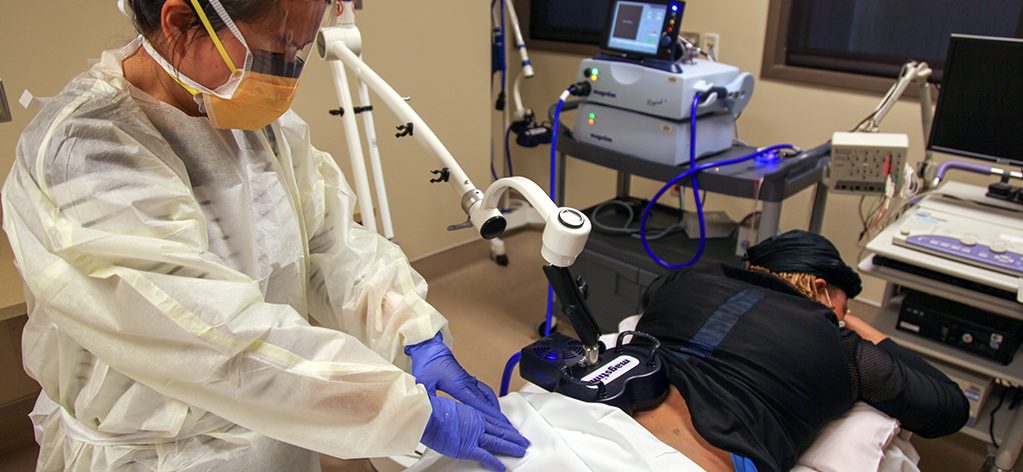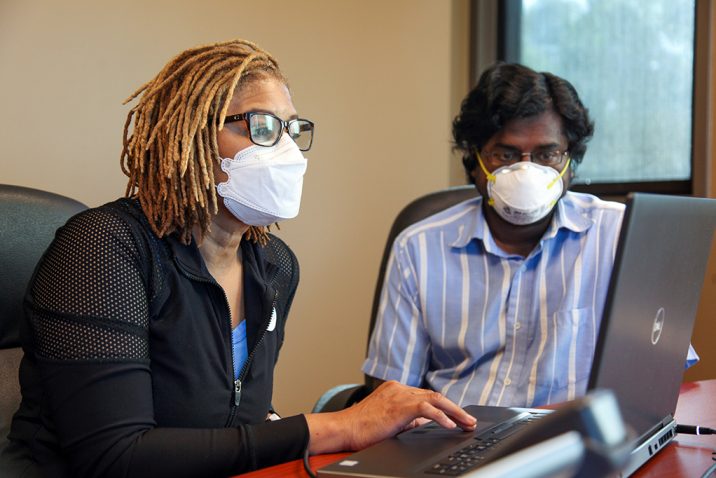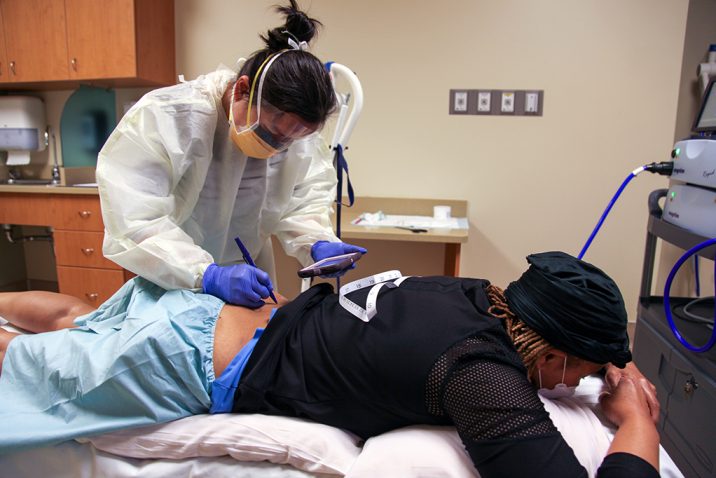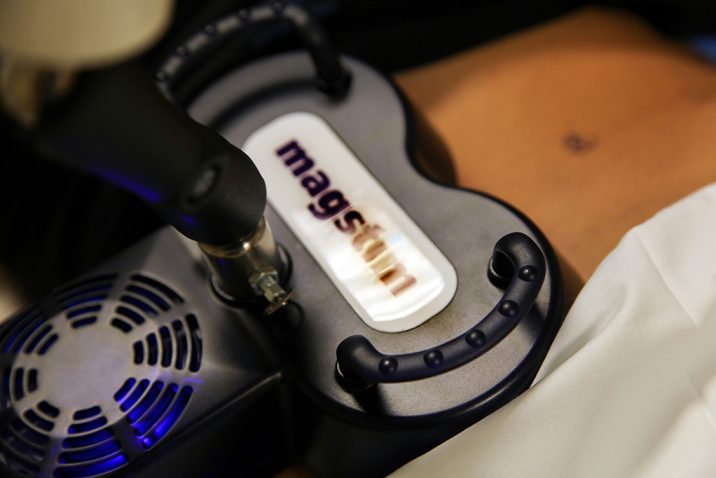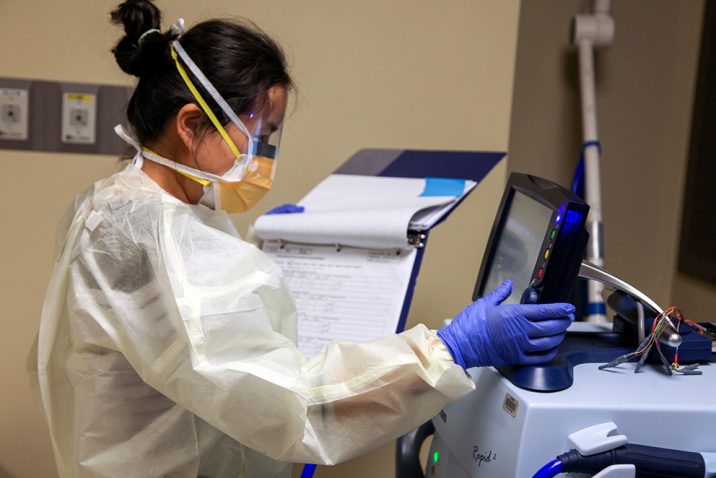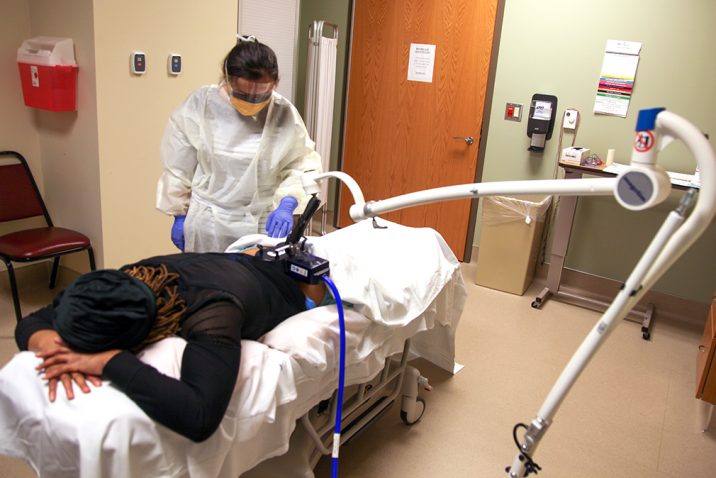It was a problem Annette Bennett was unaware was happening. After 15 years of searching for answers, she may have found some solutions through research at the Medical College of Georgia at Augusta University.
Bennett is suffering from fecal incontinence, a condition that affects millions of Americans, predominantly women and the elderly, but most patients don’t report this problem or seek remedies, so it often remains a silent affliction. According to the American College of Gastroenterology, FI is the inability to control your bowel movements, causing stool to leak unexpectedly from your rectum. Also called bowel or anal incontinence, fecal incontinence can range from occasional leakage of a small quantity of stool while passing gas to a complete loss of bowel control.
“I had a lot of inconsistency going to the bathroom … I was unaware that I was using the bathroom on myself and I had a lot of gas in my stomach,” said Bennett, who lives in Fayetteville, North Carolina. “So I am basically looking for ways to create more control for myself.”
Bennett, 57, said her gastroenterology doctor in Fayetteville had a rapport with Dr. Satish S.C. Rao, who is the J. Harold Harrison, MD, Distinguished University Chair in Gastroenterology and the director of neurogastroenterology/motility and the Digestive Health Clinical Research Center at MCG.
Rao and his team have been researching FI and looking for treatments for the past 10 years. Recently they have found that magnetic stimulation improves nerve function to the anus and rectum and significantly reduces the episodes of fecal incontinence in patients.
“We have very limited and effective treatments for fecal incontinence and stool leakage,” Rao said. “The challenge has been we don’t even know how many millions are suffering with this problem. Surveys tell us that about 10% of the American population, men and women, have leakage. We have very few limited treatment options that directly change the pathophysiology of the disease, or has an impact in improving their problem.
“What we’ve been focusing on, is to better understand the mechanisms that lead to leakage, and also develop treatments that are less invasive and those that address the underlying problem.”
Early evidence from their study shows that translumbosacral neuromodulation therapy (TNT), a novel treatment that has been pioneered in their lab with the help of NIH funding, is helping to strengthen key nerves, which in turn reduce or have even eliminated episodes of stool leakage, according to a scientific report that was recently published in the American Journal of Gastroenterology.
Once she reached her 30s, Bennett began experiencing issues with her stomach, specifically with her digestive system. She noticed she wasn’t able to digest food properly and had a lot of acid reflux, then had surgery around 1994 looking to alleviate the issues.
Bennett made the 3.5-hour drive to Augusta to begin week-long specialized testing to determine the problem and possible treatments. Results confirmed Bennett was a candidate for Rao’s research program. The initial treatment was going to start in March but that was delayed after the coronavirus pandemic began shutting places down.
Treatment was delayed but started in June and lasted for almost eight weeks. Bennett said she has tried a lot of medications throughout the years, getting some relief before the medication quit working. For her, the drive was a no-brainer for a chance to regain control over her body and a little bit of peace of mind.
“I was very frustrated and we weren’t making a lot of headway,” said Bennett, who is the assistant director for a youth center located on Fort Bragg, North Carolina. “I made the sacrifices because I was trying to be on board with this. That’s why I would take the chance to drive every weekend.”
During their research, Rao and his team developed a test called TAMS, which stands for translumbosacral anorectal magnetic stimulation. The test looks at nerve activity by placing a probe in the rectum and a coil on the back to deliver magnetic stimulation to nerves in the anus and rectum and measure the response.
Patients, like Bennett, lie face down while the test assesses nerve function from the upper and lower back. Treatment typically takes an hour. The noninvasive procedure showed that 70 to 80% of patients who come with stool leakage have nerve damage in one or more nerves.
“What that told us was a missing piece of the puzzle: that nerve damage is a critical problem in stool leakage,” Rao said.
Dr. Tennekoon Karunaratne has been Rao’s senior research associate for the past 18 months. He is the main lead and coordinator on the TNT study. His role covers most aspects in conducting the trial, including uploading scientific input, regulatory compliance, recruitment efforts, budget management, monitoring data and safety and serving as a liaison with authorities.
“Back in Europe where I did my initial medical training, I became interested in studying GI motility and enteric nervous system. As a result at University of Bologna in Italy, I did a PhD in neurogastroenterology and motility,” Karunaratne said. “The main focus of my research activities are in neurodegeneration, neuromodulation and neuroplasticity. I wrote my thesis and published on neurodegeneration and neuroplasticity in the ENS. It’s through my network that I learned about the fascinating things Dr. Rao is doing with neuromodulation. That’s a main reason why I joined his efforts.”
According to the American College of Gastroenterology, the ability to hold stool (continence) requires the rectum, anus and nervous system to be working normally. Two groups of muscles in the wall of the anus and rectum are responsible for holding the stool in the rectum. Normal continence also requires the ability to sense the presence of stool in the rectum (called rectal sensation), and the ability to relax and store stool (rectal compliance) when having a bowel movement is not convenient. In addition, you need the physical and mental capabilities to recognize the urge to go to the bathroom.
“What I’ve gained from this whole experience is that I have gotten some results from it,” said Bennett, who said she started seeing results after the third treatment. “I’m very excited about that. They helped me to where the inconsistency is not as bad now. I’m able to feel a little bit more comfortable when I come to work and when I go out shopping, because before, it was stressing me out.”
Rao said in Bennett’s case, the treatments are improving the functions of the damaged nerves and they are pleased with the progress she’s made already.
“The nerves are regrowing, adapting and changing, which leads to improvement in muscle function, and our ability to control the body, a phenomenon also known as neuromodulation. That is what is happening with her,” Rao said. “We are monitoring the nerve damage, and we will be repeating the nerve function studies, and we will see how much improvement she’s at. I can tell you from other patients who have undergone this treatment, we have seen quite dramatic changes in people’s nerve function after this treatment.”
For more information, call 706-721-1968 or email Dr. Tennekoon Karunaratne.
 Augusta University
Augusta University
